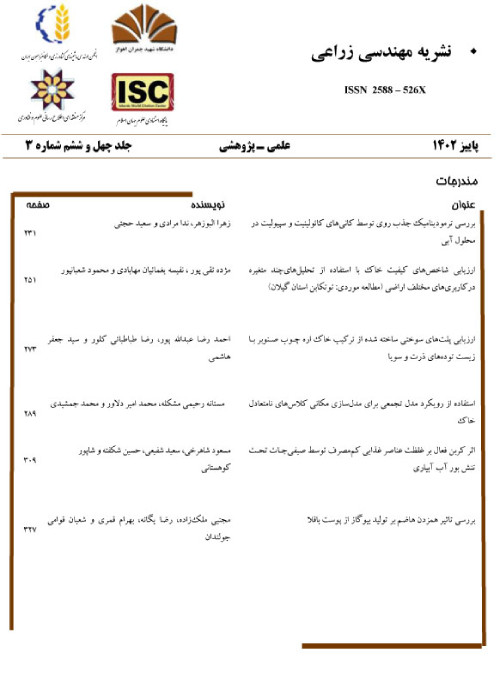Evaluation of the integrated effect of chemical and bio-organic fertilizers on yield and yield components of rapeseed
In recent years, ensuring the continuous and sustainable production of healthy food products along with environmental protection and paying attention to agricultural economic and environmental problems is very important. Although the use of chemical fertilizers has a high yield of plants, its destructive effects in the long-term are known on the soil biological, physical and chemical properties and environmental pollution. Therefore, a strategy must be considered that can improve soil health and quality as well as produce a high plant yield. Organic manures increase the growth, yield and quality of plants by improving soil conditions and the balance of essential elements. An integrated plant nutrition management system by reducing the use of chemical fertilizers is known as one of the ways to achieve the expected yield and meanwhile, minimize the adverse environmental effects of chemical fertilizers in the world.
The objective of this study was to evaluate the effect of single and combined use of chemical fertilizer (urea, triple superphosphate, potassium sulfate as NPK) with organic and biological fertilizers on the yield and yield components of transplanted canola (Brassica napus L.). Experiment was conducted in a randomized complete block design with six treatments and three replications (18 experimental units) in the 2019-2020 crop year at the Iraqi Agricultural Research Station in Gorgan, Iran. Treatments included: 1) Control (without fertilizer, T1), 2) Chemical fertilizer (T2), 3) Poultry manure (T3), 4) Compost (T4), 5) 50% Chemical fertilizer+ 50% Poultry manure+ 50% Compost (T5), 6) 50% Chemical fertilizer+ 50% Poultry manure+ 50% Compost+ Biofarm-1 biofertilizer (T6). Chemical fertilizer was applied based on soil test including nitrogen equivalent to 250 kg/ha urea was added in three stages during planting, stem elongation, before flowering; phosphorus equivalent to 150 kg/ha of triple super phosphate; potassium equivalent to 50 kg/ha of potassium sulfate, respectively. Organic fertilizers were calculated based on their total nitrogen contents and the equivalent of pure nitrogen recommended based on the soil test for chemical fertilizer and by assuming 50% mineralization rate of organic fertilizers in the soil. Biofertilizer was applied as seed inoculation plus spraying on the plant base in two stages of 4 to 8 leaves and stem elongation. Chlorophyll index was measured in the middle of the flowering stage by using SPAD. After physiological maturity, yield and yield components including pods per plant, numbers of seeds per pod, pod length, 1000-seed weight, seed yield, protein and oil contents of grain were recorded.
The results showed that the effect of fertilizer treatments was significant on yield and yield components (p <0.01). The highest 1000-seed weight, grain yield, protein content of the seed, number of seeds per pod, pod length and pods per plant were recorded in the treatment of 50% chemical fertilizer+ 50% Poultry manure+ 50% Compost+ Biofertilizer (T6) which increased by 21.9%, 43.7%, 33.8%, 29.2%, 37.2% and 37.6%, respectively, in compared to the control treatment (with the lowest values). The pods per plant, 1000-seed weight and grain yield were not significantly different between the combined treatments of chemical fertilizer+bioorganic fertilizers (T6) and integrated use of chemical and organic (T5) fertilizers (p <0.05). The control treatment (T1) by 2248.37 Kg/ha of grain yield (the minimum amount) decreased by 43.7% and 38.3% compared to T6 and T5 treatments, respectively. The chemical treatment (T2) and integrated application of chemical fertilizer+ bio-organic fertilizers (T6) showed the most positive effect on the chlorophyll index compared to other fertilizer and control treatments (with the lowest index, 43.66). Chlorophyll index in the T2 and T6 treatments increased by 35.6% and 33.7% compared to the control treatment (T1), respectively. The treated plants by alone use of organic fertilizers (T3 and T4) without notable difference produced the highest grain oil (by an average of 45.73%) which increased by 6.6% compared to the chemical fertilizer (T2) and control (T1) treatments by an average of 42.7%.
Combined use of chemical fertilizer with bio-organic fertilizers had the most positive effect on yield and yield components, and often showed significant difference with the single application of chemical and organic fertilizer treatments (T2, T3 and T4). Therefore, the combination use of chemical and bio-organic fertilizers is a better option to increase the yield and yield components of transplanted canola than the single use of chemical fertilizers. The highest pods per plant, pod length, number of seeds per pod, chlorophyll index, protein content, chlorophyll, 1000-seed weight, and grain yield were related to the integrated application of chemical fertilizer with bio-organic fertilizers (T6 and T5), so it can be inferred that the use of a mixture of organic, biological and chemical fertilizers is an effective approach to reduce the using of chemical fertilizers and their destructive environmental effects, as well as increase the yield of transplanted rapeseed.
- حق عضویت دریافتی صرف حمایت از نشریات عضو و نگهداری، تکمیل و توسعه مگیران میشود.
- پرداخت حق اشتراک و دانلود مقالات اجازه بازنشر آن در سایر رسانههای چاپی و دیجیتال را به کاربر نمیدهد.


